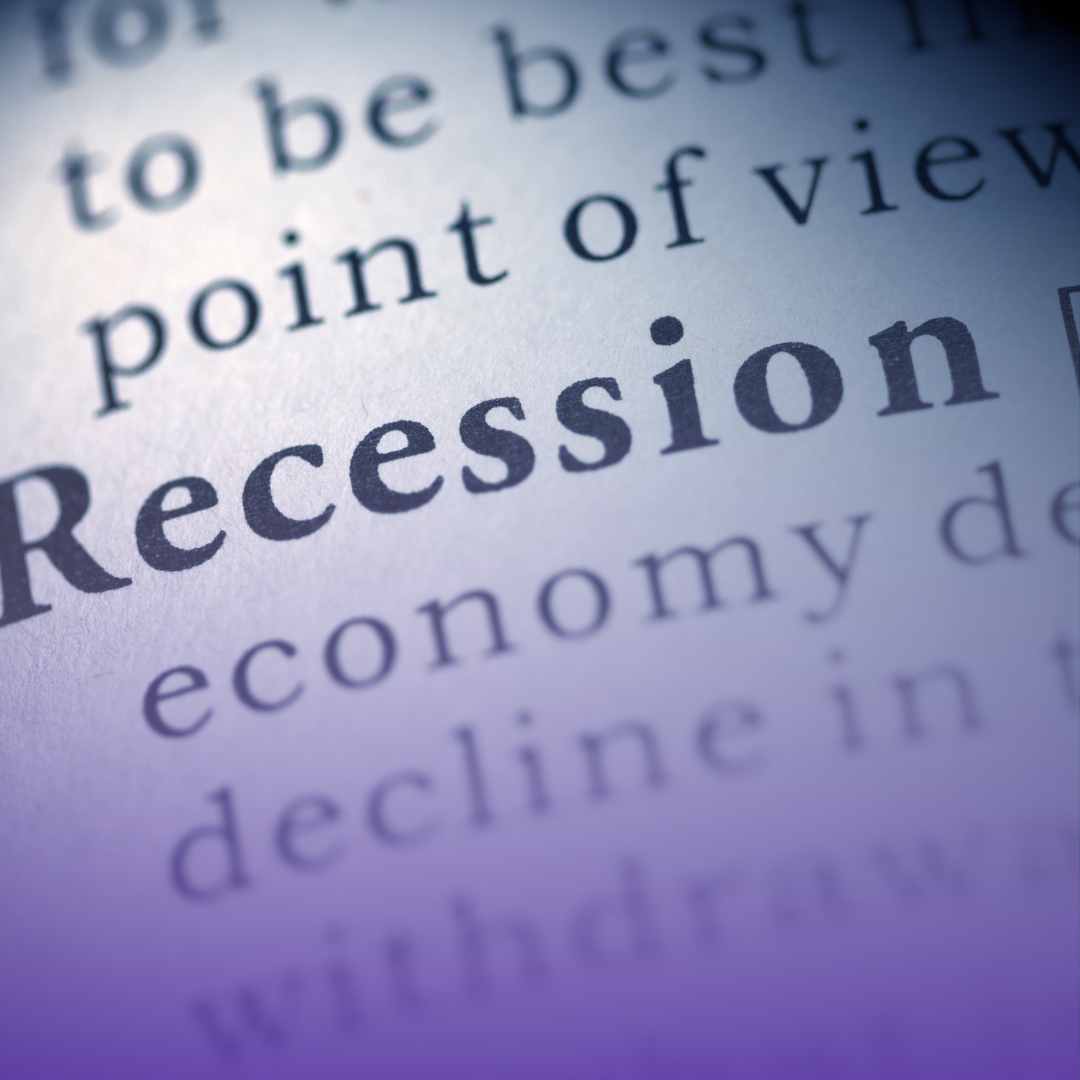Table of Contents
The word recession makes most of us uneasy. Whether it’s talk of job losses, rising inflation, or global conflicts, it’s completely normal to feel worried about your financial future. Even if Ireland isn’t officially in a recession right now, planning as if one could happen is one of the smartest things you can do. The economy can shift suddenly — or gradually — and either way, we all end up feeling the impact.
Take groceries, for example. Food prices in Ireland are now rising at three times the rate of inflation. That hits every household, recession or not.
So let’s talk about what you can do, not out of panic, but with a clear head and a solid plan.
What Is a Recession?
A recession usually means the economy is shrinking instead of growing. It often leads to:
- Job losses or reduced hours
- Slower business activity
- Higher prices for everyday essentials
- Falling house or investment values
Ireland’s economy is strong in many ways but also highly connected to global factors like multinational companies, exports, and tax revenues. That means external shocks, like trade wars or rising interest rates, can hit us harder than other countries.
You don’t need to wait for a crisis to act. Financial planning isn’t about fear — it’s about being prepared.
Ireland’s Last Recession and What We Learned
Ireland’s most recent recession happened in 2020, when the COVID-19 pandemic brought the world to a halt. Businesses closed, travel stopped, and a huge number of people lost their jobs almost overnight. Unemployment in Ireland shot up to over 28% at its peak, and the economy shrank fast, especially in sectors like retail, hospitality, and construction.
Before that, Ireland went through a much tougher recession from 2008 to 2012. It was sparked by the global financial crisis and the collapse of our own property market. House prices crashed, banks were in trouble, and thousands of people lost their jobs. Many had to emigrate to find work, and the country needed emergency financial help from the European Union (EU) and the International Monetary Fund (IMF) to stay afloat.
So, what did we learn? That things can change very quickly, even when everything seems fine. These moments reminded us of the importance of having a financial safety net — whether that’s savings, the right insurance coverage, or a solid plan to navigate tough times.
Why It’s Important to Be Ready — Even If Things Seem Fine Now
We get it — planning for something that might happen feels unnecessary when life is busy and the bills are already piling up. But here’s the thing: recessions don’t always give us advance notice.
Being financially prepared isn’t about panic. It’s about having options and protecting what matters most if the economy takes a turn.
Here’s why it matters — especially if you’re like most people in Ireland:
If You Have a Mortgage
Your monthly repayments are probably your most significant expense. You can skip takeaways or holidays, but you can’t skip your mortgage payment without serious consequences.
If interest rates rise or your income takes a hit, that same monthly repayment can quickly become a real strain on your budget.
Here are a few things you can do to stay financially prepared, no matter what comes your way.
- Switching your mortgage could be a simple way to cut costs, and you might save thousands by moving to a better deal. Our financial advisors can shop around for you and find a lender with lower rates and better terms.
- On a fixed rate that’s ending soon? Be ready, many households in Ireland are facing a sharp jump in repayments as they roll onto higher variable or fixed rates. A few hundred euros more each month can make a big difference.
- Emergency savings give you a cushion if you or your partner face reduced hours, job loss, or unexpected expenses.
- Income protection can help cover your mortgage if you’re out of work due to illness or injury. It steps in when you need it most, keeping the roof over your head.
Don’t forget about your life insurance policy. It might have been perfectly fine when you first bought your home, but things change over time. If you’ve since had children or your lifestyle has changed, your cover might not be enough anymore. It’s a good idea to review it regularly to ensure it still meets your needs. You might even find that you can switch to another provider and get the same (or better) cover for a lower cost, saving you money each month without losing peace of mind.
Plan now so you’re ready for whatever comes next. Get a quote today!
If You Have a Family to Support
When a recession hits, families often feel it first. Rising food prices, childcare costs, back-to-school expenses — it all adds up quickly, and any disruption to your income can make things even harder.
Ask yourself:
- Could your household manage without your income for a few months?
- Do you have life cover that would protect your partner and children if something happened to you?
- Would a serious illness payout help your family cope if you were unable to work?
These aren’t easy questions, but they’re important ones, because being prepared now can prevent a lot of financial stress later.
Here are a few things you can do to stay financially prepared, no matter what comes your way:
- Build up an emergency fund, even if it’s small to start with
- Review your life insurance and serious illness cover to make sure it still suits your family’s needs
- Avoid relying on credit cards for everyday expenses; they’re a short-term fix with long-term consequences
Planning ahead helps you avoid hard choices later, like dipping into debt, skipping bills, or cutting essentials your family depends on. A little time spent planning today can make all the difference if life throws you a curveball tomorrow.
If You’re Self-Employed or in a Volatile Industry
If you run your own business, freelance, or work on contracts, you probably already know that your income can be unpredictable even in good times. However, during a recession or economic slowdown, the risks become even greater.
Clients start cutting back. Projects get postponed. Invoices take longer to get paid. And suddenly, your cash flow dries up — but your bills don’t stop.
Unlike PAYE employees, you might not be entitled to the same level of state support if work slows down. And even if you qualify for some help, it often doesn’t match the reality of your monthly expenses.
Here are a few things you can do to stay financially prepared, no matter what comes your way:
- Build (or Boost) Your Emergency Fund: Aim for 6–12 months of essential expenses. Recession can dry up income streams, so having a strong safety net is critical.
- Avoid Taking on New Debt: It may be tempting to use credit during slow periods, but taking on new debt adds pressure. Explore grants, tax reliefs, or business support first.
- Maximise Tax Deductions: Work with a financial advisor to create a solid tax planning strategy. By leveraging available tax reliefs and deductions, you can reduce your tax bill and free up more money to save, invest, or put towards your financial goals. Smart planning today can lead to meaningful savings tomorrow.
- Lower Fixed Expenses: Review subscriptions, memberships, insurance, and recurring bills. Trim anything non-essential to make your monthly commitments more flexible.
- Review Your Insurance & Protection Plans: Make sure you have income protection in place—it can provide a vital safety net if you’re unable to work. Consider key person insurance to protect your business in the event of your passing, along with life insurance and serious illness coverage to safeguard your family and finances.
Planning for Recessions: Timeless Steps That Always Work
No matter your job, income level, or family situation, planning your finances is the essential first step. A recession doesn’t always come with warning signs, so the more prepared you are, the better you can navigate uncertainty.
The tips below can help you alleviate financial stress, protect your income, and stay in control, whether you’re self-employed, relying on a single income, or seeking to make smarter financial decisions in uncertain times.
Build an Emergency Fund
If your income slowed down tomorrow, how many months could you cover your bills?
Aim to save 3–6 months’ worth of expenses, even if you start small. Automate it if possible. And open a separate savings account so you’re not tempted to dip into it.
Reduce High-Interest Debt
Credit card debt and overdrafts become heavy burdens when income drops. If you’re carrying expensive debt, prioritise paying it off, especially if interest rates rise. Consider a low-interest personal loan to consolidate debts more affordably.
Protect Your Income
Your most valuable asset isn’t your home or your car — it’s your ability to earn. Income protection insurance provides a replacement income if illness or injury prevents you from working.
Review Your Insurance
In a recession, unexpected expenses, like illness, accidents, or even death, can hit much harder, especially when finances are already stretched. It’s important to ask yourself: Do you have life insurance in place to protect your family if something happens to you? Is your mortgage covered if you’re no longer around to pay it? Would a life insurance payout be enough to maintain your family’s lifestyle or support your children’s education? And if you were diagnosed with a serious illness, how would you balance getting better with still providing for your loved ones?
Even if you already have cover, it’s worth reviewing; many people are underinsured without realising it, or they may be overpaying for outdated policies.
Create (or Revisit) Your Budget
Track where your money is going. Focus on essentials and see where you can cut back before you’re forced to. Use budgeting tools or just a simple spreadsheet.
Keep Saving for the Long-Term
Even during tough times, don’t give up on your future. If possible, keep contributing to your pension, even a small amount. Recessions come and go, retirement doesn’t.
The best time to plan was yesterday — the second best time is now.
Get a Financial Planning Quote
Whether you’re concerned about global uncertainty, rising living costs, or simply want to make smarter decisions with your money, financial planning is one of the best ways to protect yourself, no matter the economic climate.
At LowQuotes.ie, we help people all across Ireland secure their income, safeguard their families, and plan for a more stable future. With expert advice and some of the best value quotes on the market, we make it simple to take control of your finances.
Get your financial planning quote today—no jargon, no pressure, just a plan that works for you.
We provide various financial services, such as life insurance, income protection, mortgages, serious illness cover, pensions, financial planning, health insurance, and savings & investments.
Share this post
All our content has been written or overseen by a qualified financial advisor. However, you should always seek individual financial advice for your unique circumstances.





